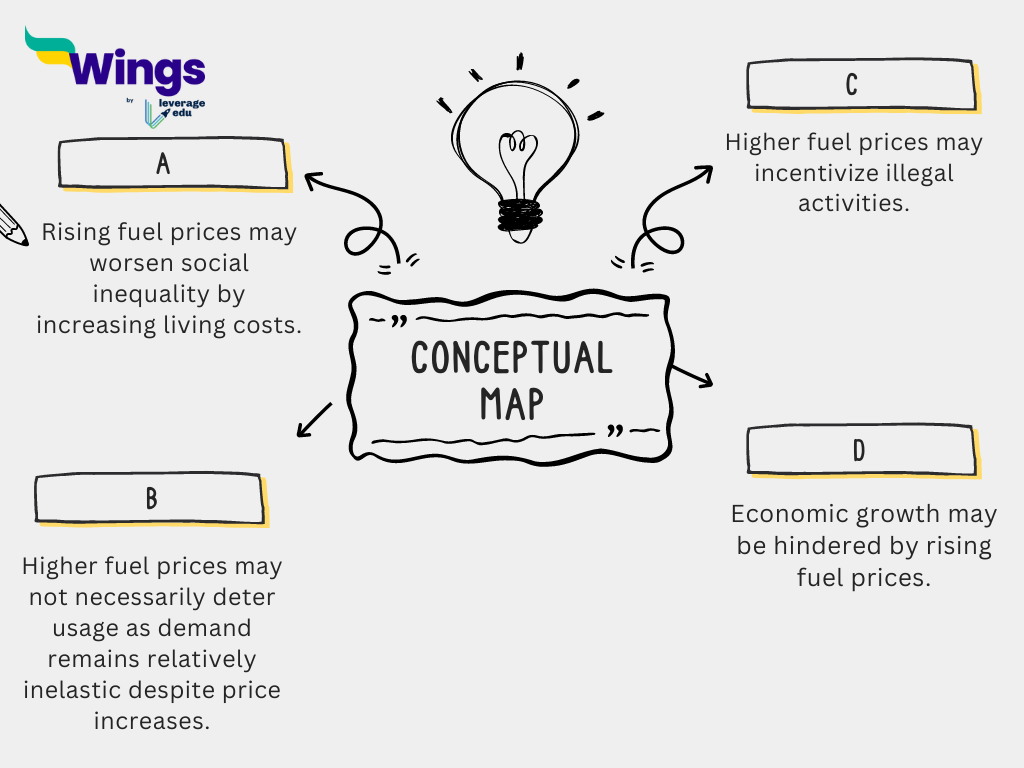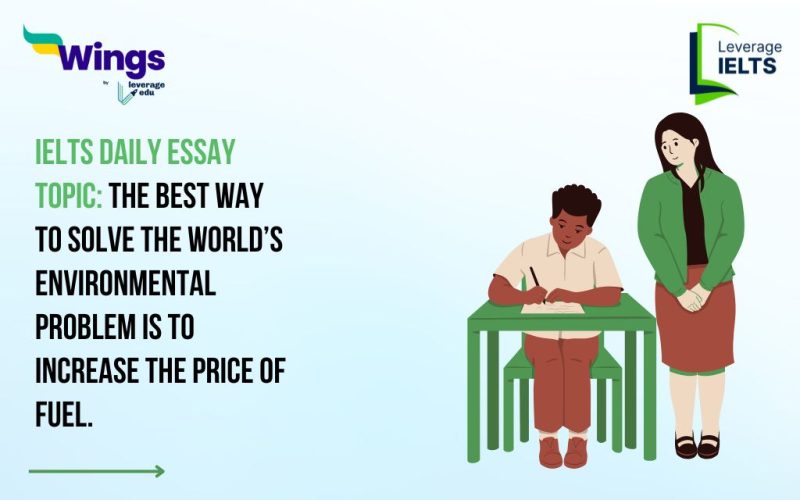Brainstorming Ideas
Refer to the following brainstorming ideas to get a better understanding of the answer.
Reasons for disagreeing the increasing the fuel prices in order to combat environmental problems:
- This would lead to a rise in living costs which can potentially exacerbate social inequality.
- The idea that higher fuel prices would deter its usage is wrong as people will still use it even if prices increase.
- Might encourage illegal activities.
- Can stifle economic growth.

Q. The best way to solve the world’s environmental problem is to increase the price of fuel. To what extent do you agree or disagree with this statement? Give reasons for your answer and include any relevant examples from your knowledge or experience. Write at least 250 words.
Ans. The proposition that escalating fuel prices is the optimal solution to the world’s environmental problems is a subject of considerable debate. While it is undeniable that this approach can have some merits, I firmly disagree that it is the best solution.
Increasing the price of fuel is a measure with significant implications for various segments of society, particularly the economically disadvantaged. In developing countries like India, where a large portion of the population depends on fuel for their daily livelihood, such a policy change would result in higher living costs and potentially exacerbate social inequality. Furthermore, the assumption that higher fuel prices would effectively deter its usage and subsequently reduce pollution may not hold true. The demand for fuel tends to be relatively inelastic, meaning people will continue to rely on it even with price increases, primarily due to the lack of viable alternatives. Insufficiently developed public transportation systems in many regions further compound this issue, as they are unable to adequately replace personal vehicle usage. While increasing fuel prices might lead to some reduction in usage, the overall impact on pollution levels is unlikely to be substantial.
Moreover, increasing fuel prices may inadvertently encourage illegal activities such as smuggling and black market sales of fuel, leading to other problems such as the loss of government revenue and increased crime rates. Additionally, such measures can potentially stifle economic growth. Industries heavily reliant on fuel, such as manufacturing and transportation, could witness significant cost increases, resulting in reduced profits, layoffs, and even business closures. Thus, fuel price hikes could prove detrimental to the nation’s growth, highlighting the need for careful consideration of the broader impacts of such measures.
To conclude, while increasing fuel prices can be one of the strategies to combat environmental issues, it certainly is not the best solution due to its potential to increase economic inequality and its limited effectiveness in reducing pollution. Therefore, an approach that includes promoting renewable energy sources, improving energy efficiency, and investing in robust public transportation systems could be a more effective strategy to address these environmental challenges.
Analysis
Paraphrased Statement: The proposition that escalating fuel prices is the optimal solution to the world’s environmental problems is a subject of considerable debate.
Thesis Statement: While it is undeniable that this approach can have some merits, I firmly disagree that it is the best solution.
Body Paragraph 1-Topic Sentences: Increasing the price of fuel is a measure with significant implications for various segments of society, particularly the economically disadvantaged. In developing countries like India, where a large portion of the population depends on fuel for their daily livelihood, such a policy change would result in higher living costs and potentially exacerbate social inequality.
Body Paragraph 1- Supporting Reasons and Explanations: Furthermore, the assumption that higher fuel prices would effectively deter its usage and subsequently reduce pollution may not hold true. The demand for fuel tends to be relatively inelastic, meaning people will continue to rely on it even with price increases, primarily due to the lack of viable alternatives. Insufficiently developed public transportation systems in many regions further compound this issue, as they are unable to adequately replace personal vehicle usage. While increasing fuel prices might lead to some reduction in usage, the overall impact on pollution levels is unlikely to be substantial.
Body Paragraph 2- Topic sentence: Moreover, increasing fuel prices may inadvertently encourage illegal activities such as smuggling and black market sales of fuel, leading to other problems such as the loss of government revenue and increased crime rates. Additionally, such measures can potentially stifle economic growth.
Body paragraph 2- Supporting Reasons and Explanations: Industries heavily reliant on fuel, such as manufacturing and transportation, could witness significant cost increases, resulting in reduced profits, layoffs, and even business closures. Thus, fuel price hikes could prove detrimental to the nation’s growth, highlighting the need for careful consideration of the broader impacts of such measures.
Conclusion: To conclude, while increasing fuel prices can be one of the strategies to combat environmental issues, it certainly is not the best solution due to its potential to increase economic inequality and its limited effectiveness in reducing pollution. Therefore, an approach that includes promoting renewable energy sources, improving energy efficiency, and investing in robust public transportation systems could be a more effective strategy to address these environmental challenges.
Vocabulary in Use
| Word | Meanings |
| Proposition | A business offer or suggestion, or a statement that needs proof. |
| Escalating | Increasing or intensifying. |
| Optimal Solution | The best way to solve a problem or achieve a goal. |
| A Significant Proportion | A large and important part of a group or an amount. |
| Exacerbate | To make a situation, an illness, or bad feelings worse. |
| Condensed | Reduced in size, length, or importance. |
| Lack Of Viable Alternatives | Absence of practical options or solutions. |
| Inadvertently | Unintentionally, without planning or realizing. |
| Stifle | To prevent something from happening or someone from expressing something. |
Linkers and Connectors Used:
Following are the linkers and connectors used:
- While
- Firstly
- For example
- Secondly
- For instance
- Thirdly
- Fourthly
- In conclusion
Are you preparing for IELTS? Check out this video to improve your writing skills for the IELTS exam given below👇.
| Related Blogs | ||
| IELTS Eligibility: IELTS Exam Age Limit & Qualification | IELTS Exam Dates, Registration, Result, Preparation | IELTS Sample Tests: PDF (Download), Exam Pattern |
| IELTS Marking Scheme | IELTS Scoring System & Grading | IELTS Test Centres in India | IELTS Syllabus & Section-Wise Exam Pattern |
Download the Leverage IELTS App today.


Need help preparing for IELTS? Check out the best IELTS preparation courses in the market offered in a live training environment by trusted educators. If you want to help studying abroad, call 1800572130.


 One app for all your study abroad needs
One app for all your study abroad needs












 60,000+ students trusted us with their dreams. Take the first step today!
60,000+ students trusted us with their dreams. Take the first step today!